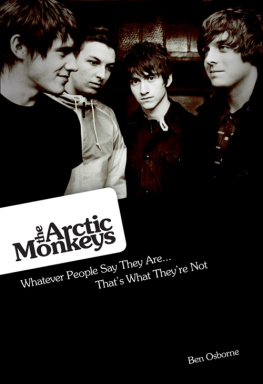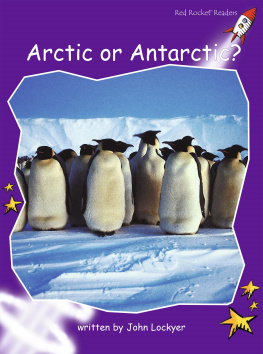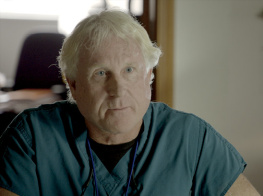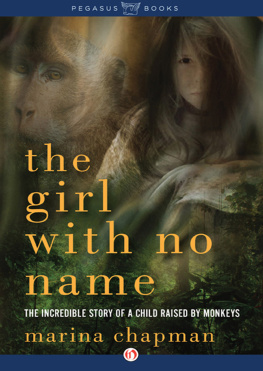Osborne Ben - Arctic Monkeys: Whatever People Say They Are... Thats What Theyre Not
Here you can read online Osborne Ben - Arctic Monkeys: Whatever People Say They Are... Thats What Theyre Not full text of the book (entire story) in english for free. Download pdf and epub, get meaning, cover and reviews about this ebook. year: 2013, publisher: Music Sales, genre: Non-fiction. Description of the work, (preface) as well as reviews are available. Best literature library LitArk.com created for fans of good reading and offers a wide selection of genres:
Romance novel
Science fiction
Adventure
Detective
Science
History
Home and family
Prose
Art
Politics
Computer
Non-fiction
Religion
Business
Children
Humor
Choose a favorite category and find really read worthwhile books. Enjoy immersion in the world of imagination, feel the emotions of the characters or learn something new for yourself, make an fascinating discovery.
- Book:Arctic Monkeys: Whatever People Say They Are... Thats What Theyre Not
- Author:
- Publisher:Music Sales
- Genre:
- Year:2013
- Rating:3 / 5
- Favourites:Add to favourites
- Your mark:
- 60
- 1
- 2
- 3
- 4
- 5
Arctic Monkeys: Whatever People Say They Are... Thats What Theyre Not: summary, description and annotation
We offer to read an annotation, description, summary or preface (depends on what the author of the book "Arctic Monkeys: Whatever People Say They Are... Thats What Theyre Not" wrote himself). If you haven't found the necessary information about the book — write in the comments, we will try to find it.
Osborne Ben: author's other books
Who wrote Arctic Monkeys: Whatever People Say They Are... Thats What Theyre Not? Find out the surname, the name of the author of the book and a list of all author's works by series.
Arctic Monkeys: Whatever People Say They Are... Thats What Theyre Not — read online for free the complete book (whole text) full work
Below is the text of the book, divided by pages. System saving the place of the last page read, allows you to conveniently read the book "Arctic Monkeys: Whatever People Say They Are... Thats What Theyre Not" online for free, without having to search again every time where you left off. Put a bookmark, and you can go to the page where you finished reading at any time.
Font size:
Interval:
Bookmark:


Copyright 2013 Omnibus Press
This edition 2013 Omnibus Press
(A Division of Music Sales Limited, 14-15 Berners Street, London W1T 3LJ)
EISBN: 978-0-85712-859-1
Cover designed by Fresh Lemon
Picture research by Jacqui Black
The Author hereby asserts his / her right to be identified as the author of this work in accordance with Sections 77 to 78 of the Copyright, Designs and Patents Act 1988.
All rights reserved. No part of this book may be reproduced in any form or by any electronic or mechanical means, including information storage and retrieval systems, without permission in writing from the publisher, except by a reviewer who may quote brief passages.
Every effort has been made to trace the copyright holders of the photographs in this book, but one or two were unreachable. We would be grateful if the photographers concerned would contact us.
A catalogue record of this book is available from the British Library.
For all your musical needs including instruments, sheet music and accessories, visit www.musicroom.com
For on-demand sheet music straight to your home printer, visit www.sheetmusicdirect.com
Many are owed gratitude, so I apologise to those not mentioned by name in this truncated acknowledgement. You are not forgotten. Thank you to my literary agent, Sarah Such, and David Baz Barraclough, Charlie Harris, Paul Woods and all at Omnibus who made this book possible. To everyone who shared their stories, contacts and insights and all the music people, journalists, publications, radio stations, websites, fans and everyone who has supported, and all who continue to support, good music. Thank you to Dad and Mum, who indulged my noisy passion; likewise to, and in memory of, Liz. To all my friends and family, old and new, and, with love and gratitude for all, to C and L, to whom this book is dedicated. Finally, thank you Arctic Monkeys for the songs.
C AUGHT in the densely packed mops of dripping hair, shiny sweat-drenched faces, smiles and happily chanting voices, a brief snap freeze-framed the storm that had left everyone hot and soaking. There were faces in this room that had travelled miles to get here, friends and strangers who had become family. And onstage, grinning because at moments like this it was impossible not to, were four friends whod been pinching themselves, disbelieving their luck for a year now.
In a brief moment, the frontman with the winsome pixie-like quality, the human Slinky New Yorkers had dubbed Harry Potter, had raised a lone index finger in the air to signify that the next song, which everyone was about to sing so loudly he wouldnt be able to hear himself, had got to number one in the singles chart.
What he didnt know yet was that, by this time tomorrow, their debut LP would unassailably top the album charts on its first day of sales.
But right here, now, tonight, as he raised his finger and people realised what he meant, a thousand tiny shivers simultaneously swept down a thousand sweat-drenched spines.
In the next moment the crowd would start singing; the chords would slow; a collision of guitar, bass and drums would slam together with pinpoint precision. And after that, all hell would break loose.
I N 2002, a group of suburban school friends walked out of their last exam and, wondering what to do next, decided to form a band. One of them already had a guitar, as did his next-door neighbour, while another had acquired a bass and a fourth was allotted the drums.
Before they played a single note together they agreed a name: Arctic Monkeys. It was given to them by the second guitarist, James Cook although no one can quite remember why.
From this off-the-cuff start, the band would go on to create the fastest-selling UK debut album by any band ever. They would also be recognised as the first act to be broken by the internet and, after racking up four number one albums, would headline the 2012 Olympics opening ceremony alongside Sir Paul McCartney, in front of 27.3 million people.
Not bad for a group of boys who walked out of their last exam barely capable of playing their instruments. As they would one day recall, theyd only wanted to form a band to play cover versions of Strokes songs for their mates. Somehow it had all got a bit serious.
But then their tale is a very familiar British rocknroll story the journey of a group of teenagers travelling from a small-town backwater to global glory.
Before rocknroll, the United Kingdom had not made that great a contribution to music. To be sure, there were outstanding composers in the classical tradition Elgar, Purcell, Vaughan Williams, Britten and the music hall had thrown up performers such as Flanagan & Allen. But for a nation that had created the furthest reaching empire the world had known, its influence on global music had been disproportionately slight. Russia, France, Italy, Germany and the Austro-Hungarians could all look down their noses at Great Britain with some justification.
When North America exported the homogeneous culture of the twentieth century, with the sounds of the swinging Twenties morphing into jazz and movie musicals, Britains musicians increasingly fell into line behind the US screen stars.
By the time rocknroll had sent the first wave of youth culture crashing around the world in the Fifties, the UK was already in thrall to American music fashions. Just as the French created Johnny Hallyday in the image of Elvis, so the Brits fashioned Cliff Richard and Billy Fury into neutered rocknroll heroes that Fifties mums and dads were happy to listen to.
The Sixties changed all that. Liverpool, London, Manchester and further flung reaches of the UK found their voice. They gobbled up US influences and spat them back with a distinctly British twang. They took distorted guitar lines that owed as much to Bo Diddley as Buddy Holly and restructured them into English power chords. The Beatles and The Rolling Stones led the way, but, once the secret was out, a new mix of multiple musical heritages bubbled to the surface.
Rather than being the processed music of popular culture, it was a raw sound inspired by the downtrodden of America, taken from the delta and urban blues traditions of Leadbelly, John Lee Hooker and Muddy Waters.
For more than two decades the UK continued to provide the world with genre-defining artists as diverse as The Kinks, The Bee Gees, Led Zeppelin, Deep Purple, Pink Floyd, David Bowie, The Clash and The Jam. The list goes on. Coming from the little-known housing estates, minor suburbs, ancient university seats, small market towns and obscure corners of England, they sprang onto the world stage and defined new forms of popular music.
In the late Eighties it was Sheffields turn to unleash a global movement, as the first of a clutch of new wave synth-pop acts emerged from the city. The Human League paved the way for the glamour of the New Romantics: London-based Culture Club, Birminghams Duran Duran and others who spearheaded a new invasion of the USA by British bands.
By the turn of the twenty-first century, however, Britains musical lineage had started fading. The big bands of the Nineties had made less of a global impact than the home-grown hype had anticipated. More importantly, the whole recorded music industry had gone into crisis, as the commercial value of music was terminally undermined by the internet.
Font size:
Interval:
Bookmark:
Similar books «Arctic Monkeys: Whatever People Say They Are... Thats What Theyre Not»
Look at similar books to Arctic Monkeys: Whatever People Say They Are... Thats What Theyre Not. We have selected literature similar in name and meaning in the hope of providing readers with more options to find new, interesting, not yet read works.
Discussion, reviews of the book Arctic Monkeys: Whatever People Say They Are... Thats What Theyre Not and just readers' own opinions. Leave your comments, write what you think about the work, its meaning or the main characters. Specify what exactly you liked and what you didn't like, and why you think so.










